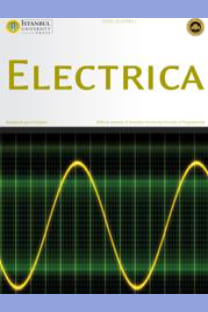Implementation of New Stochastic Algorithm of Network Reconfiguration in Distribution Systems for Losses and Costs Reduction
Implementation of New Stochastic Algorithm of Network Reconfiguration in Distribution Systems for Losses and Costs Reduction
Feeder reconfiguration, Point Estimate Method (PEM), multi-objective, firefly, wind turbines, distribution.,
___
- T. Ackerman, G. Anderson, L. Soder, “Distributed generation: a definition,” Elsevier Sci. 195–204, 2003.
- D. Zhu, R.P. Broadwater, K. Tam, R. Seguin, H. Asgeirsson, “ Impact of DG placement on reliability and efficiency with time-varying loads,” IEEE Transactions on Power Systems 21 (1) , 419–427, 2006.
- “Distributed Energy Resources Guide,” The California Energy Commission, 2003. [Online]. Available: http://www.energy.ca.gov/ .
- “Wind power systems,” in Encyclopedia of Physical Science and Technology, 3rd ed. New York: Academic, 200 Y.T. Hsiao, C.Y. Chien , “ Multiobjective optimal feeder reconfiguration ,” IEE Proceedings Generation, Transmission and Distribution, 148(4):333–336, 2001.
- H. Merlin, “Search for a minimal-loss operating spanning tree configuration in an urban power distribution system,” in: Proceedings of the Fifth Power System Computation Conference, Cambridge, UK, pp. 1–18, 2008.
- S. Civanlar, J.J. Grainger, H. Yin, S.S.H. Lee, “Distribution feeder reconfiguration for loss reduction,” IEEE Trans Power Deliver; 3(4):1217–23, 2010.
- K. Aoki, H. Kawabara, T. Satoh, M. Kanezashi, “An efficient algorithm for load balancing of transformers and feeders,” IEEE Trans Power Deliver; 3(4):1865–72, 200
- G. Celli, E. Ghiani, S. Mocci, F. and Pilo, F., “A multiobjective evolutionary algorithm for the sizing and siting of distributed generation,” IEEE Trans. Power Syst., vol. 20, no. 2, pp. 750–757, May 2009.
- T. Taylor, D. Lubkeman, “Implementation of heuristic search strategies for distribution feeder reconfiguration,” IEEE Trans. Power Del, vol. 5, pp. 239 – 245, 1990.
- P. Agalgaonkar, S.V. Kulkarni, S.A. Khaparde, S.A. Soman, “Placement and penetration of distributed generation under standard market design,” Int J Emerg Electr Power Syst;1(1), 2004.
- J. Olamaie, T. Niknam, G. Gharehpetion, “Application of particle swarm optimization for distribution feeder reconfiguration considering distributed generators,” Appl Math Comput ;20(1):575– 86, 2008.
- J.M. Morales, J. Perez-Ruiz, “Point estimate schemes to solve the probabilistic power flow,” IEEE Transactions on Power System, vol. 22, pp. 1594-1601, .200
- R. Billinton, and P. Wang, “Teaching Distribution System Reliability Evaluation Using Monte Carlo Simulation,” IEEE Transactions on Power Systems, vol. 14, no. 2, pp. 397-403, May 1999.
- A. Soroudi, M. Ehsan, R. Caire, N. Hadjsaid, “Possibilistic evaluation of distributed generations Impacts on distribution networks,” IEEE Trans on Power Syst, vol. 26, pp. 2293 – 2301, 2011.
- X.S. Yang, “Nature-Inspired Metaheuristic Algorithms,” Frome: Luniver Press. ISBN 1905986106, 2008.
- T. Apostolopoulos, A. Vlachos, “Application of the Firefly Algorithm for Solving the Economic Emissions Load Dispatch Problem,” International Journal of Combinatorics, ID: 523806, 2011.
- Y.P. Cai, G.H. Huang, Z.F. Yang, Q. Tan, “Identification of optimal strategies for energy management systems planning under multiple uncertainties,” Appl Energy 9;86(4):480–95, 2009.
- R.R. Tan, K.B. Aviso, I.U. Barilea, A.B. Culaba, J.B. Cruz, “ A fuzzy multi-regional input-output optimization model for biomass production and trade under resource and footprint constraints,”Appl Energy, in press. ISSN: 030626
- M.E. Baran, F.F. Wu, “ Network reconfiguration in distribution systems for loss reduction and load balancing,” IEEE Trans on Power Del, vol. 4, pp. 1401 – 1407, 1989.
- T. Niknam, “An efficient hybrid evolutionary based on PSO and ACO algorithms for distribution feeder reconfiguration,” European Trans on Elect Power, vol. 20, pp. 575 – 590, 2010.
- T. Niknam, S.I. Taheri , J. Aghaei, S. Tabatabaei, M. Nayeripour, “ A modified honey bee mating optimization algorithm for multiobjective placement of renewable energy resources,” Applied Energy , vol. 88 , pp. 4817-4830, 2011.
- T.E. McDermott, I. Drezga, R.P. Broadwater, “A heuristic nonlinear constructive method for distribution system reconfiguration,” IEEE Trans on Power Sys, vol. 14, pp. 478 – 483, 1999.
- S.Jr. Carneiro, J.L.R. Pereira, M.P. Vinagre, P.A.N. Garcia, L.R. Araujo, “ A New Heuristic Reconfiguration Algorithm for Large Distribution Systems,” IEEE Tran on Power sys, vol. 20 , pp. 1373 – 1378, 2005.
- T. Niknam, A. Kavousifard, A. Seifi, “Distribution feeder reconfiguration considering fuel cell/wind/photovoltaic power Plants,” Journal of Renewable Energy, vol. 37, pp. 213-225, 2011.
- D. Shirmohammadi, H.W. Hong, “Reconfiguration of electric distribution networks for resistive line loss reduction,” IEEE Trans, Power System, vol. 4, pp. 1492 – 1498, 1989.
- ISSN: 2619-9831
- Yayın Aralığı: 3
- Başlangıç: 2001
- Yayıncı: İstanbul Üniversitesi-Cerrahpaşa
Reza SEDAGHATI, Ahmad ROHANI, Yaser NEMATI, Navid JAVIDTASH, Ali HEYDARJEDAGAN, Hossein SEDAGHATI
DESING AND DEVELOPMENT OF A HOME MEDIA SHARING APPLICATION FOR W-CDMA FEMTO CELLS
Serpil USTEBAY, Burak AMASYALI, M. AYDIN, A. ZALİM
Performance Analysis and Applications of Passive Optical Networks
CURRENT FED FULL-BRIDGE CONVERTER WITH VOLTAGE DOUBLER FOR PHOTOVOLTAIC SYSTEM APPLICATIONS
R. BALAMURUGAN, V. KAMSALA, R. NITHYA
A PROTOTYPE DESIGN OF HOLTER ECG SYSTEM
Gürcan TAŞPINAR, Mehmet ENGIN, Erkan ENGİN
NEW DXCCII-BASED GROUNDED SERIES INDUCTANCE SIMULATOR TOPOLOGIES
Vijayakumar GOVIND, C. KARTHIKEYAN, V. RAVI
CMOS DESIGN OF A MULTI_INPUT ANALOG MULTIPLIER AND DIVIDER CIRCUIT
